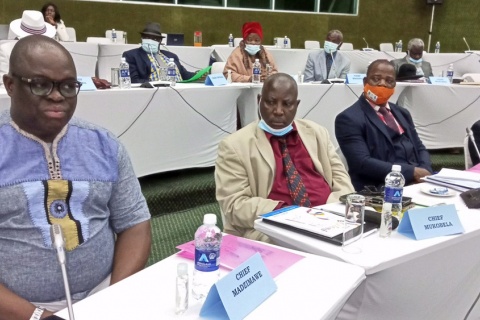Traditional authorities in Zambia complain that the government does not consult them when land is allocated for investment projects, while communities say chiefs are neglecting their interests. Jesinta Kunda of Zambia Land Alliance says more clarity is needed on the role of traditional authorities, in law and practice, to ensure large-scale investments in agriculture, mining and other sectors are governed better – particularly in light of the rising demand for critical minerals found in Zambia. She urges the government, traditional leaders and citizens to seize the opportunities presented by current legal reforms in Zambia to create change.
La tierra es un recurso finito, y el acceso a ella es esencial para la subsistencia de las personas y las comunidades. Para garantizar que el acceso a la tierra sea seguro y equitativo para todos, las Naciones Unidas han establecido el Objetivo de Desarrollo Sostenible (ODS) 1.4.2, que mide la seguridad de la tenencia de la tierra de las personas, y el ODS 5.a.1, que mide la seguridad de la tenencia de la tierra agrícola desde una perspectiva de género.
La terre est une ressource limitée, et son accès est essentiel pour les moyens de subsistance des individus et des communautés. Pour que l'accès à la terre soit sûr et équitable pour tous, les Nations unies ont fixé l'objectif de développement durable (ODD) 1.4.2, qui mesure la sécurité tenure foncière des individus, et l'ODD 5.a.1, qui mesure la sécurité tenure sur les terres agricoles dans une perspective de genre.
Land is a finite resource, and access to it is essential for the livelihoods of individuals and communities. To ensure that access to land is secure and equitable for all, the United Nations has set the Sustainable Development Goal (SDG) 1.4.2, which measures individuals' land tenure security, and SDG 5.a.1, which measures tenure security over agricultural land from a gender perspective.
A terra é um recurso finito, e o acesso a ela é essencial para a subsistência de indivíduos e comunidades. Para garantir que o acesso à terra seja seguro e equitativo para todos, as Nações Unidas estabeleceram os Objetivos de Desenvolvimento Sustentável (ODS) 1.4.2, que mede a segurança da posse da terra para os indivíduos, e o ODS 5.a.1, que mede a segurança da posse da terra agrícola a partir de uma perspectiva de gênero.
Land is a finite resource, and access to it is essential for the livelihoods of individuals and communities. To ensure that access to land is secure and equitable for all, the United Nations has set the Sustainable Development Goal (SDG) 1.4.2, which measures individuals' land tenure security, and SDG 5.a.1, which measures tenure security over agricultural land from a gender perspective.
In a blog series from IIED and the Land Portal, rights defenders and practitioners in the global South reflect on their strategies to push for more responsible and sustainable land-based investments. Here, guest blogger Jesinta Kunda describes how civil society organizations were key to improving Zambia’s first ever National Lands Policy.
Uma revisão de quatro artigos recentes sobre uma questão subexplorada: os motivos do fracasso de acordos de terra em larga escala e o que isso significa para as comunidades e a sociedade
Un examen de quatre articles récents sur une question peu explorée : les raisons de l'échec des transactions foncières à grande échelle et ce que cela signifie pour les communautés et la société.
Una revisión de cuatro artículos recientes sobre un tema poco explorado: las razones del fracaso de las transacciones de tierras a gran escala y lo que eso significa para las comunidades y la sociedad
A review of four recent articles about an underexplored issue: the reasons for large-scale land deals to fail and what that means for communities and society
Overcoming Land Disputes by Fostering Relationships in Communities: Experiences from Zambia’s Systematic Land Titling Program
Written by Dimuna Phiri and Kamiji Malasha
Unresolved disputes and disorder, can be addressed through the judicial system. However, the process is expensive, slow, unscalable, and does not focus on reconciling individuals, families and communities. Through the lens of beneficiaries, this article reveals the importance of alternative dispute resolution in land reforms, particularly adjudication committees.
Just like many African countries, a majority of Zambian tribes follow a matrilineal system, that is, an affinity system in which descent is derived through maternal instead of paternal lines which essentially means children are recognised by the names or family of their mothers. This does not only affect decent but also involves the inheritance of titles and property including land through the female line. One might ask why women have less access and control of land in Zambia when land and property is inherited through maternal lines.






